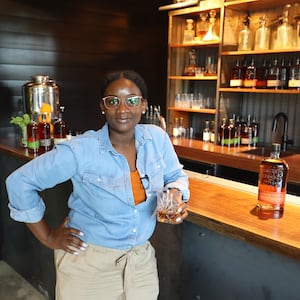Kwame Onwuachi is one of the most celebrated young chefs working today with his acclaimed Afro-Caribbean restaurant Kith and Kin in the InterContinental Hotel in Washington, D.C.’s Wharf development. Last year, he won the James Beard Award for Rising Star Chef of the Year. Had things worked out differently, however, he may have instead become a famous rapper.
Growing up in New York, Onwuachi had a turbulent childhood, spending a couple of years with relatives in Nigeria for misbehaving in school and later, upon returning to the Bronx, joining a gang. For a period, he also worked in restaurants to support his music career. In his early 20s, Onwuachi’s passion for cooking won out. He sold candy bars to fund his first catering business, going on to graduate from the Culinary Institute of America and working at world-class establishments Eleven Madison Park and Per Se.
In 2015, he opened his first D.C. restaurant, Shaw Bijou (now shuttered), and currently helms Kith and Kin, which draws inspiration from his family’s roots. His signature dishes include braised oxtails, jollof rice and goat roti.
Onwuachi chronicled his experiences and meteoric rise—including his appearance on Top Chef season 13—in his memoir Notes from a Young Black Chef, released last July.
He chatted with us about his daily schedule and shared the advice he gives new chefs.

What did you want to be when you were growing up? “I wanted to be a lot of things. I wanted to be a professional basketball player, but that didn’t really last long. I wanted to be a rapper for quite some time. I was really into that before I got really into cooking. I wanted to be a chemical engineer, but I was always around food—my mother was a chef. My family’s Creole-Cajun on one side and Afro-Caribbean on the other. So, I’ve always been around food. I come from a long line of chefs. During the Jim Crow-era in the South, black people couldn’t really go out to eat at a lot of restaurants, so a lot of families had convenience stores and juke joints and bars in the back of their homes. And my family was the one that always had the restaurants. So, my family’s always been cooking. It’s been ingrained in me. So even when I was aspiring to these other things, cooking was a constant in my life.”
How did you train to be a chef? “My first job was working in my mom’s catering company when I was five-years-old out of our house. And then my first paying job was McDonald’s. And after that, I worked retail briefly working at Abercrombie & Fitch for like a year, but every other time I’ve had a job it was in the food industry, whether it was a waiter, line cook or a dishwasher. So, I was still cooking while I was pursuing this rap career. I would wait tables or something like that and put my money into studio time. But when it really hit me was when I was I was a chef on a boat for about 40 crew members [working to clean up] the Deepwater Horizon oil spill in the Gulf of Mexico. Cooking food and directly giving it to people and seeing their expression was something that really left an impact on me. So from there, I never really turned back. I went to New York and started working in restaurants and was still doing rap a little bit, but then I started my own catering company. And that’s really where I started taking it seriously.”
What was the experience of opening Kith and Kin like? “Kith and Kin was incredibly challenging. It’s the biggest restaurant I’ve ever led. I haven’t even worked in a restaurant that big really. There were a lot of challenges [regarding] how to make it work within that space. It was a larger scale. You know, we have about two hundred seats. We do breakfast, lunch and dinner. We’re open seven days a week. We also do room service for the entire hotel. So it was a lot of learning on how to size my food up and make it make sense with the tools that I had.”
Can you tell us your typical daily routine? “I wake up in the morning and the first thing I do is work out on the treadmill. From there, I have a quick bite to eat and head into the restaurant, check in on prep and make sure that’s going well. Check in with the sous chef on duty. I usually check in with the general manager of the hotel. And it’s a lot of emails out of meetings, expediting lunch service and tasting everything on the line for lunch and for dinner. So it kind of varies and depends on the day. Some days I’m out doing a shoot, you know, in Los Angeles—I’m going to do a commercial for T-Mobile in L.A. tomorrow. So, you know, my days vary a lot, but in the restaurant it’s pretty much the same: get in there, check in with everyone, check all my emails, expedite lunch service, take a break, then expedite dinner service, walk into the dining room to check on it periodically throughout service, and I’m continuously doing tastings and making sure everything is consistent.”
What’s the most challenging part of your job? “I would say the most challenging part is dealing with people. And that’s, you know, the guests, but also the staff, managing people is an art. You don’t just wear one hat, you know, you have to be there, you have to listen. You have to make sure that you are showing empathy and building camaraderie constantly. You know, cause we go in there, it’s a grueling job that we do for hours and hours and hours and it’s like the same exact thing every single time. So it’s important to let them feel heard and let them know that you’re there for them.”
What tools do you usually have with you while you’re working? “A knife and a cutting board. I like Nenox Knives, but a sharp knife for me is more important than anything else. And then tasting spoons. A knife and tasting spoons for me are everything. Any kind of spoon will do it.”
What advice do you have for aspiring chefs? “I think it’s really important to take care of your health. It’s really easy to let that go. Like let your health go because you’re constantly tasting things every day. And on your days off, you just want to hang out and chill, but staying active is really, really important. If you don’t have good health, you don’t have anything.”
A Day in the Life features the daily routines and career paths of bartenders, chefs, distillers and brand ambassadors.
Interview has been condensed and edited.


